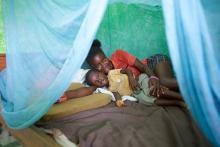
Malaria poses a tremendous public health threat across the globe: An estimated 3.3 billion people, or 40 percent of the world’s population, live in areas of malaria risk. The investments made in insecticide-treated net (ITN) distribution, indoor residual spraying (IRS), malaria in pregnancy, and prompt diagnosis and treatment of malaria infections have made significant gains, yet many challenges remain. Among these challenges is the question of how to best measure the fight against malaria.
Nationally representative, population-based household surveys are a principal measurement tool to collect data for measuring outcome and impact indicators for malaria programs and interventions. Household surveys are especially relevant in many endemic settings for measuring coverage of interventions that primarily target the household level, such as ITN distributions, and for understanding patterns of intermittent preventive treatment (IPTp) among pregnant women and diagnostic testing and antimalarial use among children with fever.
This course provides an overview of the malaria indicators collected through household surveys, permitting learners to understand the data collection, calculation, and interpretation of key malaria indicators.
Objective
By the end of the course, the learner will be able to:
- Describe the methodology and malaria-related content of population-based household surveys such as the Demographic and Health Survey (DHS), Malaria Indicator Survey (MIS), and Multiple Indicator Cluster Survey (MICS)
- Identify numerators and denominators of key household malaria indicators
- Describe considerations for the interpretation of key indicators
- Use indicators from household surveys to answer key malaria programmatic questions and inform programs and policy
Credits
The course authors would also like to thank the following individuals for their contributions to the course:
Misun Choi, PMI
Lia Florey, PMI
Anna Bowen, PMI
Hannah Koenker, VectorWorks, Johns Hopkins Center for Communication Programs
Sarah Yang, The DHS Program
Trevor Croft, The DHS Program
Michael Toso, Breakthrough Action, Johns Hopkins Center for Communication Programs
Sammy Oppong, Ghana National Malaria Control Program
Austin Gumbo, Malawi National Malaria Control Program
Ashley Garley, MEASURE Evaluation
Time
- 2 hours
Published/Updated
- Monday, June 11, 2018
Course Authors:
Annē Linn, The DHS Program
Cameron Taylor, The DHS Program
Erica Nybro, The DHS Program
Course Managers:
- Shannon Davis, CCP
